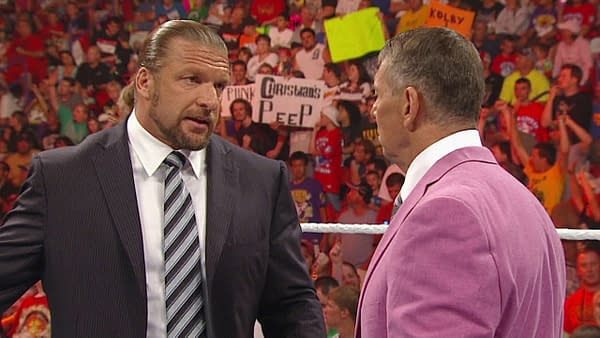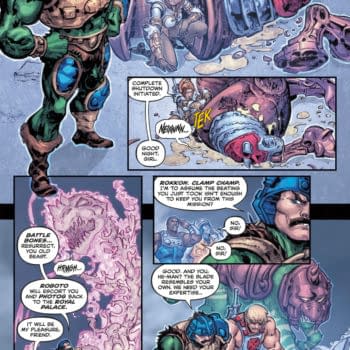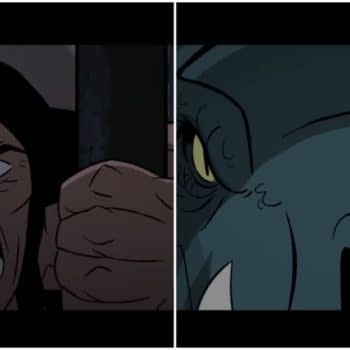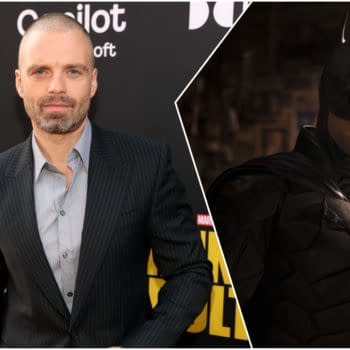Posted in: Sports, TV, WWE | Tagged: Triple H, wrestling, wwe
Triple H Promotes False WWE Narrative About Wrestling History
Triple H has taken over WWE Creative after the sudden "retirement" of a scandal-plagued, beleaguered Vince McMahon, but while most agree this will result in better storylines, not everything about the toxic corporate culture of WWE is going to change overnight. And when it comes to promoting the inaccurate, WWE-centric version of wrestling history touted by the company over the past few decades, it seems the apple doesn't too far from the tree-in-law.

Triple H appeared on Logan Paul's Impaulsive podcast, where he made a remark about Vince McMahon's legacy that's riled wrestling historians all over the internet. Speaking about McMahon's contributions to the wrestling business, Haitch claimed that McMahon took the sport from "this tiny little thing happening in bars" to "this big global sensation."
Here's the full quote in context:
Look, I'll say this about Vince. Massive shoes that I couldn't even dream of beginning to think I could fill. The gap there in this moment is massive, but the opportunity to take it in a direction that it's never gone before is massive. I'm thrilled for that opportunity. We have an unbelievable team that is never going to be one person. One person can't even begin to fill his shoes. It's going to take an entire team of people to jump in those shoes, because without him, there's none of this. The vision to take it from this tiny little thing happening in bars to this this big global sensation like nothing else. WrestleMania is one of the most valuable sports franchises on the planet. Billions of social media followers, the 70 plus billion lifetime views on on YouTube. The level of fan interaction, following, and dedication and passion for what we do, there's nothing like it. And I'll put any sport against that, and I'll put any form of entertainment. Certain movies only resonate in certain countries. Certain sports only resonate in certain countries. Name one that goes everywhere. It's WWE.
Of course, wrestling was not a "tiny, little thing happening in bars" before Vince McMahon purchased WWE, the dominant regional wrestling promotion in the Northeastern United States with a home base in the largest city in the country, from his father. WWE itself (or WWF and WWWF as it was previously known) wasn't playing in bars either, as the company regularly filled venues like Madison Square Garden and held multiple "Showdown at Shea" Stadium events that drew tens of thousands of fans to see stars like Bruno Sammartino and Andre the Giant wrestle. Wrestling was popular and drew large crowds in territories all over the country, as well as in Japan and Mexico, where wrestling events since the 1950s drew anywhere from 10,000 to 60,000 fans in the decades before Vince took over WWE. In the United States, wrestling was a major draw on television, where Gorgeous George became a huge celebrity and helped drive the growth of the medium itself.
Was there wrestling, before Vince McMahon, that took place in bars? Certainly, just as it also took place at that time in basketball arenas and baseball stadiums. Likewise, there's wrestling today that takes place in bars and other tiny venues. Acknowledging that wrestling was successful before Vince McMahon does nothing to diminish McMahon's success at crushing his competition and taking WWE to a new level as a global entertainment corporation. It doesn't negate those billions of social media followers or YouTube views. But it "WWE" isn't the sport that resonates globally across different cultural barriers. The sport is wrestling. WWE is one brand of that sport, currently the most popular by far. But not the first, and certainly not the only. Nevertheless, WWE, inexplicably insecure for a "global sensation," has done its best to convince its fans otherwise, and with a two-decade monopoly on wrestling in the United States, they've had a lot of success in that area.
But one person who absolutely knows it isn't true is Triple H, who has an elite-level understanding of the history of wrestling, which makes his willingness to push such an obviously false narrative all the more egregious and disappointing. And WWE's patented revisionist history wasn't the only bad tendency on display in the interview. According to our count, Triple H referred to WWE's business as "what we do" four times in the interview, and "this business" or "our business" nine times, and "sports entertainment" once, but he used the actual word "wrestling" zero times to describe it. The more things change, the more they stay the same.















